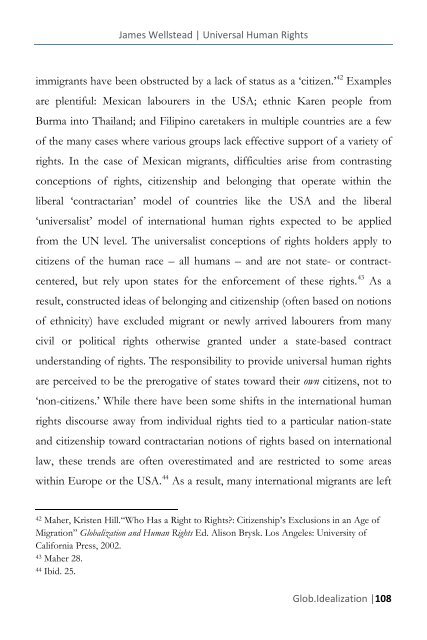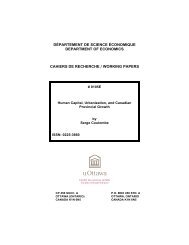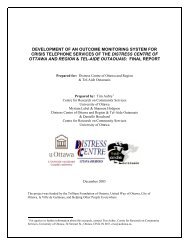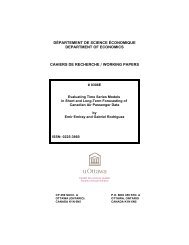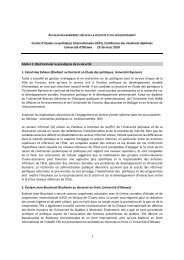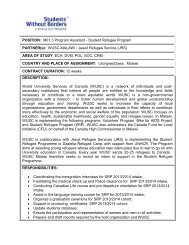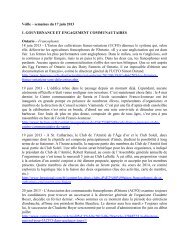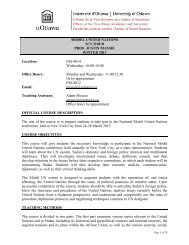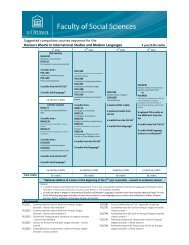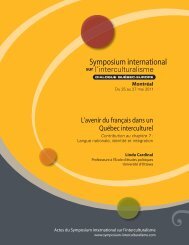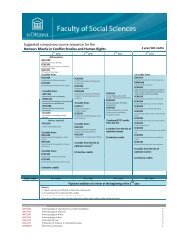GLOB.IDEALIZATION MOND.IDÉALISATION - Faculty of Social ...
GLOB.IDEALIZATION MOND.IDÉALISATION - Faculty of Social ...
GLOB.IDEALIZATION MOND.IDÉALISATION - Faculty of Social ...
You also want an ePaper? Increase the reach of your titles
YUMPU automatically turns print PDFs into web optimized ePapers that Google loves.
James Wellstead | Universal Human Rights<br />
immigrants have been obstructed by a lack <strong>of</strong> status as a ‘citizen.’ 42 Examples<br />
are plentiful: Mexican labourers in the USA; ethnic Karen people from<br />
Burma into Thailand; and Filipino caretakers in multiple countries are a few<br />
<strong>of</strong> the many cases where various groups lack effective support <strong>of</strong> a variety <strong>of</strong><br />
rights. In the case <strong>of</strong> Mexican migrants, difficulties arise from contrasting<br />
conceptions <strong>of</strong> rights, citizenship and belonging that operate within the<br />
liberal ‘contractarian’ model <strong>of</strong> countries like the USA and the liberal<br />
‘universalist’ model <strong>of</strong> international human rights expected to be applied<br />
from the UN level. The universalist conceptions <strong>of</strong> rights holders apply to<br />
citizens <strong>of</strong> the human race – all humans – and are not state- or contractcentered,<br />
but rely upon states for the enforcement <strong>of</strong> these rights. 43 As a<br />
result, constructed ideas <strong>of</strong> belonging and citizenship (<strong>of</strong>ten based on notions<br />
<strong>of</strong> ethnicity) have excluded migrant or newly arrived labourers from many<br />
civil or political rights otherwise granted under a state-based contract<br />
understanding <strong>of</strong> rights. The responsibility to provide universal human rights<br />
are perceived to be the prerogative <strong>of</strong> states toward their own citizens, not to<br />
‘non-citizens.’ While there have been some shifts in the international human<br />
rights discourse away from individual rights tied to a particular nation-state<br />
and citizenship toward contractarian notions <strong>of</strong> rights based on international<br />
law, these trends are <strong>of</strong>ten overestimated and are restricted to some areas<br />
within Europe or the USA. 44<br />
As a result, many international migrants are left<br />
42 Maher, Kristen Hill.“Who Has a Right to Rights?: Citizenship’s Exclusions in an Age <strong>of</strong><br />
Migration” Globalization and Human Rights Ed. Alison Brysk. Los Angeles: University <strong>of</strong><br />
California Press, 2002.<br />
43 Maher 28.<br />
44 Ibid. 25.<br />
Glob.Idealization |108


